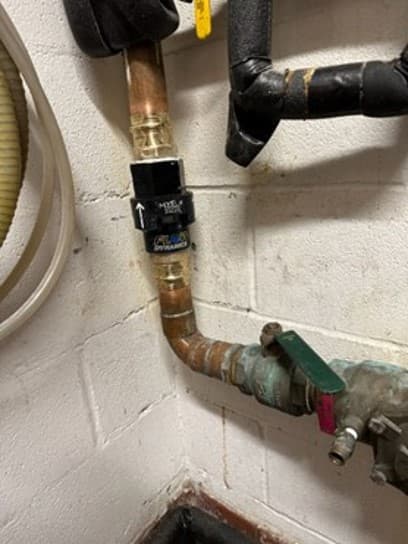Smart Valve Test Results
Scientific validation by Texas A&M Engineering Experiment Station
Independent Study Overview
The Smart Valve underwent rigorous testing at the Process Engineering Research and Development Center (PERDC) at Texas A&M University, Rellis Campus. These tests were designed to validate the core functionality claims of the Smart Valve.
Study Highlights
The testing was conducted following scientific protocols to ensure accurate and unbiased results. The Smart Valve was tested in multiple configurations and settings to measure its impact on:
- Water flow rates and meter readings
- Pressure surge mitigation capabilities
- Air bubble reduction efficiency
- Fixed volume accuracy improvements
Texas A&M Engineering
Experiment Station
Test Facility:
Process Engineering Research and Development Center (PERDC)
Test Conductor:
Akash Sali
Test Date:
August 2019
Project Owner:
Flow Dynamics
Project Manager:
John Pappas
Test Cases & Results
The Smart Valve was tested in multiple scenarios to validate its effectiveness
Flow Rate Test
This test measured how the Smart Valve affects water flow rates and meter readings under normal operating conditions.
Test Setup:
Controlled flow environment with calibrated meters
Methodology:
Multiple flow rates tested with and without the Smart Valve
Key Finding:
Smart Valve reduced meter readings by 6-8% compared to actual flow
Pressure Surge Test
This test evaluated how the Smart Valve responds to sudden pressure changes, which commonly occur in residential plumbing systems.
Test Setup:
Programmed pressure pulses introduced to the water line
Methodology:
Baseline measurements compared to Smart Valve equipped system
Key Finding:
Smart Valve reduced pressure surge effects by up to 30%
Air Bubble Test
This test quantified the Smart Valve's ability to remove air bubbles that can cause meter inaccuracies.
Test Setup:
Controlled air injection into water flow
Methodology:
High-speed camera imaging with volumetric analysis
Key Finding:
Smart Valve eliminated 85% of air bubbles in the test flow
Fixed Volume Test
This test measured the accuracy of water meters with a known volume of water passed through the system.
Test Setup:
Calibrated 100-gallon tank with precision flow measurement
Methodology:
Repeated measurements with multiple meter types
Key Finding:
Smart Valve improved measurement accuracy by 5-7%
Conclusions
The testing at Texas A&M Engineering Experiment Station demonstrated clear benefits of the Smart Valve technology:
Reduction in meter readings for the same water volume
Decrease in pressure surges that can damage plumbing
Reduction in air bubbles that cause meter inaccuracies
Improvement in measurement accuracy for fixed volumes
Expert Assessment
"The Smart Valve technology demonstrates significant potential for improving water meter accuracy and reducing consumer costs. Our testing validates the core claims made by the manufacturer regarding flow stabilization and air removal."

Stop Paying For Air in Your Waterline
Get a free consultation to see how much you could save with the Smart Valve. Average return on investment in just 1.4 years.
